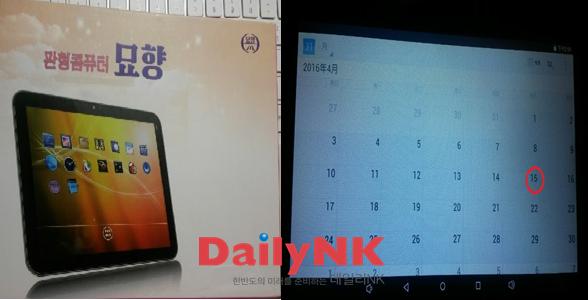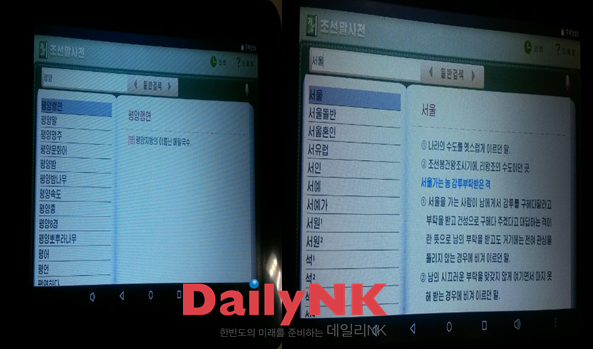The tablet computer “Myohyang,” lauded in North Korean state media as the product of homegrown technology, features a calendar absent of two of the country’s most significant holidays: the respective birthdays of former leaders Kim Il Sung and Kim Jong Il. Naturally, this has raised suspicions that the tablet may actually be a foreign product outfitted for the North Korean market, Daily NK has learned.
Released last year by the company Pyongje, “Myohyang”–which comes preset with Mt. Paektu’s Lake Cheonji as the background image– houses applications allowing users to read and archive pieces online [the intranet] from state mouthpieces including Rodong Sinmun and Uriminzokkiri, and a camera that can also record video.
However, according to a source in North Pyongan Province, “it’s inconceivable that a product made in the North would not mark the Day of the Sun [Kim Il Sung’s birthday] nor the Day of the Shining Star [Kim Jong Il’s birthday].”
This news was corroborated by additional sources in South Pyongan Province and Pyongyang.
Moreover, most of the tablet’s applications appear in Chinese, including the calendar, which features Chinese characters instead of the usual English or Korean.
“Everyone points out that it’s hard to understand why Chinese characters would be used for a domestic product,” she said. “Unless [the state] is just to try to make things deliberately harder for people for some reason, the simplest explanation is the most rational: the North doesn’t have the technology to override and alter the [Chinese] programs.”
“But most people think the missing holiday on the calendar is just an oversight because adding it in couldn’t have been that complex,” she added. Likewise, the Korean language dictionary function on the tablet contains an entry for the “Day of the Sun,” lending further weight to the mistake theory and prompting sardonic university students to call it “a sign that the most powerful propaganda machine in the world is losing its edge.”
Irrespective of its origins and limitations, the dictionary is one of the most popular features of the tablet. The application boasts a cache of over 120,000 words, available in seconds at the user’s convenience, unlike the unwieldy, outdated, and rarely consulted bound version. The Grand People’s Study House (central library in Pyongyang) and Kim Il Sung University websites are also said to be popular resources for research purposes, according to the source.
“Quite a number of curious college students are using the tool to look up terms like human rights, market economy, succession, Seoul, Pyongyang [no entry, see photo below], and historic incidents to compare the state-sanctioned definition [and their connotation in state media] with the situation on the ground,” she said, adding that some are even bold enough to use memory sticks to secretly read illegal foreign books on their new devices.



















